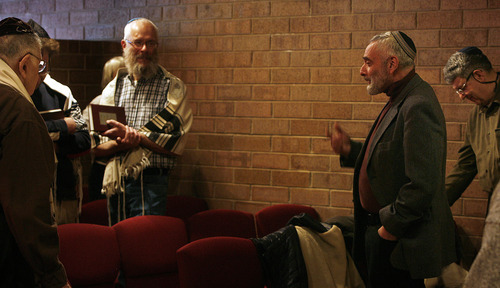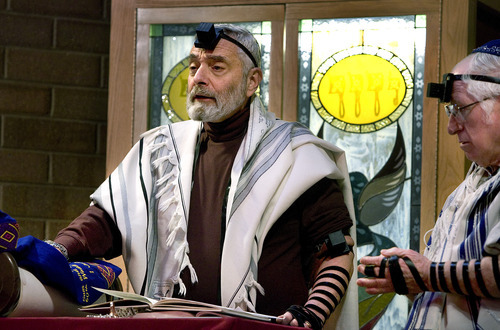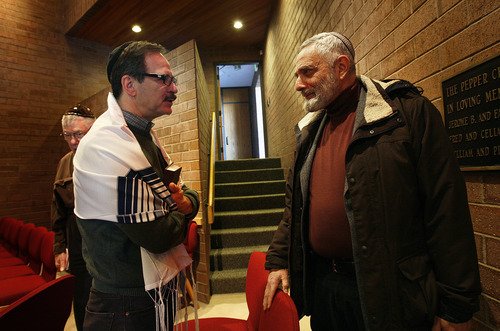This is an archived article that was published on sltrib.com in 2012, and information in the article may be outdated. It is provided only for personal research purposes and may not be reprinted.
Before he embarks upon 10 hours of singing each Yom Kippur — the holiest day on the Jewish calendar — Congregation Kol Ami's cantor reflects for a moment.
"I always look up and say, 'Here I am, God. Here I am again,' " Laurence Loeb said. " 'It's going to be a long, long day, a lot of singing, and, if I manage to get through all of it, it's because of you and for you. I can't do this on my own.' "
But Loeb, a salt-and-pepper-haired grandfather of eight, always gets through it. For that feat, for the hundreds of students he's tutored and for the 50 years he has served as a cantor, Kol Ami will honor Loeb on Sunday with dinner, dancing and tributes.
At synagogues around the world, cantors lead prayers through music, adding emotional inflection to the words and scriptures Jews cherish. Like rabbis, they teach and support congregants through life events.
"It's a long time coming," Danny Burman, synagogue board president, said of the celebration. "He's been such a stalwart of this community, such a centerpiece. We've gone through a few rabbis over the years, but Cantor Loeb has always been there for us."
Loeb has spent 33 of his 50 cantorial years singing part time at Kol Ami. During those decades, Utah's largest synagogue has seen about a half-dozen rabbis come and go, but Loeb's lyric baritone has remained a steady soundtrack.
Loeb, who turns 70 this month, still leads services about 10 times a month.
"To a certain extent, he harkens back to a generation of cantors that are difficult to find now," said Rabbi Fred Wenger, who led Kol Ami for 16 years. "To find that kind of cantorial talent in a place like Salt Lake City is indeed nothing short of a miracle."
An unexpected turn • Working as a cantor in Utah wasn't a career path Loeb always envisioned.
He grew up in Manhattan, participated in the Jewish group United Synagogue Youth and aimed to study engineering after high school.
One day, a youth group director who was studying to be a cantor took Loeb aside. He urged him to enroll in a seminary and become a cantor.
Loeb balked, telling him of his engineering plans. He had never studied music, he told him. He couldn't even read music. But the director insisted he apply.
With nothing to lose, Loeb auditioned.
"It was really embarrassing," he said, remembering the experience, now with a lifetime of earned expertise. "I got up there and I showed my total ignorance of music."
Yet for reasons he still doesn't quite understand, New York's Jewish Theological Seminary admitted him. To Loeb's surprise, his mother — the less religious of his parents — encouraged him to take it.
"It was really quite a poignant moment," Loeb said. "She said to me, 'You have a beautiful voice, and it's like calling to you to get up there and do this.' "
He studied for 12 years, learning theology, liturgy and music.
"It was extremely difficult the first couple years. I was really way behind everybody else because my musical knowledge was so limited," Loeb recalled, "but I worked hard at it."
Eventually, he found his voice and his vocation — at least one of them.
The 'canthropologist' • Loeb has never been satisfied with just one interest — or just one profession.
His studies of ethnomusicology at the seminary led him to an interest in anthropology. He went on to earn a doctorate in anthropology from Columbia University.
"Anthropology was just the intellectual pursuit for me," Loeb explained, "because it's the study of everything human beings do."
It was a field that took him to Iran, Israel and Morocco, researching cultures and music. It ultimately brought him to the Beehive State, where he worked as an associate professor at the University of Utah for 38 years.
Loeb retired from the U. last year, though his wife of nearly 45 years, Nomi, still enjoys teasing him with a name a friend gave him years ago because of his disparate professions: canthropologist.
"I probably didn't achieve everything I would have liked to because of being in this kind of a schizoid existence, but I know what I gave up, and I'm not sorry. I think what I gained from it was very worth the effort," Loeb said, sitting in the living room of his Holladay home, walls covered with evidence of both his passions — framed Hebrew texts alongside art and musical instruments from Iran.
He gained the joys of academia, working with bright colleagues, digging into intriguing questions and interacting with peers worldwide.
But he also gained the "religious thrill" of regularly leading a congregation in worship.
"It's just been a very full and rich kind of living," Loeb said.
He estimates he has tutored nearly 500 students toward bar and bat mitzvah. He and his wife, who worked as principal of the synagogue's religious school for about 15 years, have watched many children mature.
"There's been a great deal of joy to that, just seeing those young ones grow up and become, as we say, menschen," Nomi Loeb said, using a Yiddish word for "good people."
Rising up • Evidence of Loeb's contributions to Utah's Jewish community will be clear at Sunday's celebration.
About 300 people will attend, including neighbors, former students, lifelong friends and the Loebs' three grown children, who will fly in from California, Washington, D.C., and Israel. A booklet to accompany the celebration holds about 70 messages from around the country thanking Loeb for his service.
"A voice of gold that has enriched the lives of the congregation as well as our own," reads one note.
"Thank you for guiding us through the most important simchas [joyous occasions] of our lives," reads another, under a photo of the thankful couple on their wedding day.
A note from another family calls the cantor "probably the only voice teacher who attempted to teach" the family to sing on-key.
Those who see Loeb regularly, including at the morning minyan services the cantor leads several mornings a week, say he has been an invaluable leader.
"He knows what he's doing, and he's got a nice voice, really a great voice," said Ira Tannenbaum, who's been attending Kol Ami for Loeb's entire tenure. "It makes a difference."
Kol Ami member Irwin Berry has also been worshipping with Loeb for 30 years.
"He doesn't take it as a job," Berry said. "He takes it as a commitment to God."
No swan song • Loeb doesn't plan to give up that commitment anytime soon. He's worked as a cantor all these years not just to serve God and his community, but also because he relishes the role.
"We live in a world in which we're constantly dealing with reality and a reality that isn't always pleasant … but every once in a while," Loeb said, "you get a transcendental experience in which you rise up above all that."
On Yom Kippur, the Day of Atonement, Loeb experiences that.
"There are moments in the service," he said, "where I stop really thinking about what I'm doing and I just rise up."
It doesn't go unnoticed. Loeb said each Yom Kippur, congregation members tell him he was better than the year before.
"I say, 'One year, you'll come to me, and you'll say, 'You were fabulous, almost as good as last year,' " Loeb jokes, "and that will be the year that I retire."
For now, he'll keep singing.
What is a cantor?
In Judaism, cantors lead prayers through music. They also teach and support congregants through life events.







